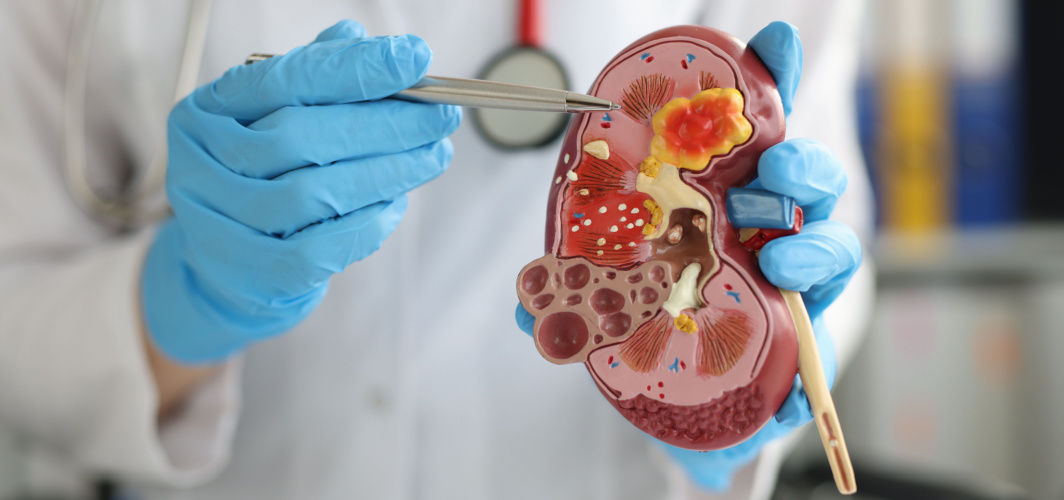General Health
Kidney Failure: Symptoms, Cause, Diagnosis, Treatment, Prevention
8 min read
By Apollo Pharmacy, Published on - 24 August 2023
Share this article
0
0 like

Kidney failure, also known as renal failure, occurs when the kidneys are unable to function properly. The kidneys play a crucial role in processing waste products and excess fluid from the blood, producing hormones that regulate blood pressure, and maintaining electrolyte balance. When kidney function declines, waste products and fluids can accumulate in the body, leading to various symptoms. In this article, we will delve into the symptoms, cause, diagnosis, treatment, and prevention of kidney failure to help you effectively manage this condition.
Symptoms of Kidney Failure
Recognizing kidney failure symptoms is crucial to seek treatment promptly.
1. Early symptoms
Some common early kidney failure symptoms include:
- Fatigue and weakness: Feeling constantly tired and lacking energy could be a sign of kidney failure. The kidneys are responsible for filtering waste products from the blood, and when they aren't functioning properly, it can lead to fatigue.
- Changes in urination pattern: Paying attention to changes in your urine can provide important clues about your kidney health. Symptoms such as increased frequency, decreased volume, or foamy appearance may indicate kidney problems.
- Swelling in the legs, ankles, or feet: When kidneys fail to remove excess fluid from the body, it can result in swelling in the extremities. This swelling is known as edema and is a common symptom of kidney failure.
2. Advanced symptoms
- Shortness of breath: This can occur due to the build-up of fluids in the lungs, which is a common complication of kidney failure. It may be accompanied by a cough or difficulty breathing.
- Nausea and vomiting: Kidney failure can lead to a build-up of waste products in the body, causing nausea and vomiting. These symptoms can be persistent and may affect appetite.
- Loss of appetite: As kidney function declines, it can lead to a decrease in appetite and weight loss. This can be due to a combination of factors, including the accumulation of toxins in the body and changes in hormone levels.
Causes and Risk Factors of Kidney Failure
1. Chronic kidney disease (CKD)
Chronic kidney disease is one of the primary causes of kidney failure. Some of the risk factors for developing CKD include:
- High blood pressure: Uncontrolled high blood pressure can damage the blood vessels in the kidneys, leading to kidney damage and eventual failure.
- Diabetes: When blood sugar levels are consistently high, it can cause damage to the small blood vessels in the kidneys, impairing their function.
- Glomerulonephritis: This is a group of diseases that cause inflammation and damage to the glomeruli, which are tiny filters in the kidneys. If left untreated, glomerulonephritis can progress to kidney failure.
2. Acute kidney injury (AKI)
Some of the causes of AKI include:
- Dehydration: When the body is dehydrated, there is a decrease in blood flow to the kidneys, leading to impaired kidney function. This can occur due to inadequate fluid intake or excessive fluid loss through sweating, vomiting, or diarrhea.
- Infections: Certain bacterial or viral infections can directly affect the kidneys, causing inflammation and damage. Urinary tract infections, kidney infections, and sepsis are some examples of infections that can lead to AKI.
3. Other risk factors
- Age and gender: As you grow older, your risk of developing kidney failure increases. This is because the kidneys naturally undergo a gradual decline in function over time. Research suggests that men are at a higher risk of kidney failure compared to women.
- Family history of kidney disease: If you have a family history of kidney disease, you may be at an increased risk of developing kidney failure yourself. Genetic factors can play a role in the development of certain kidney conditions.
Diagnosis of Kidney Failure
1. Physical examination and medical history
During a physical examination, your doctor will assess your overall health, check for any signs of fluid retention or swelling, and listen for abnormal sounds in your abdomen. They may also inquire about any symptoms you have been experiencing and ask about your medical history, including any previous kidney problems or risk factors.
2. Blood tests
Blood tests are essential in diagnosing kidney failure. The two most common blood tests include:
- Serum creatinine level: Serum creatinine is a waste product produced by muscles that are filtered out of the blood by the kidneys. Elevated levels of serum creatinine indicate decreased kidney function.
- Estimated glomerular filtration rate (eGFR): The eGFR is a calculation that estimates how much blood is being filtered by the kidneys each minute.
3. Urine tests
Two common types of urine tests are:
- Urinalysis: Urinalysis involves analyzing a sample of your urine to check for abnormalities. It can help detect the presence of red and white blood cells, bacteria, and other substances that may indicate kidney damage or infection.
- Proteinuria test: Proteinuria refers to the presence of excess protein in the urine, which can be a sign of kidney dysfunction. This test measures the amount of protein in your urine and helps assess the severity of kidney damage.
4. Imaging tests
- Ultrasound scan: This non-invasive test uses sound waves to create images of the kidneys. It can help detect abnormalities such as kidney stones, cysts, tumors, or structural changes in the kidneys. They are ideal for evaluating kidney function, blood flow, and any blockages in the urinary tract.
- CT scan or MRI: These imaging tests provide more detailed pictures of the kidneys. They can help identify kidney tumors, infections, obstructions, or other conditions that may be causing kidney failure. CT scans use X-rays and a computer to create cross-sectional images, while MRI uses powerful magnets and radio waves to generate detailed images of the kidneys.
Treatment Options for Kidney Failure
When it comes to managing kidney failure, there are several treatment options available.
1. Conservative management and lifestyle changes
This approach focuses on making certain lifestyle modifications to help manage kidney failure effectively. Some of these modifications include:
- Dietary modifications (low-sodium, low-protein diet): Following a low-sodium and low-protein diet can help reduce the workload on the kidneys and prevent further damage.
- Fluid control and hydration: Limiting fluid intake is important for individuals with kidney failure to prevent fluid overload. However, it is also essential to maintain proper hydration levels under medical supervision.
- Blood pressure control and medication management: Controlling blood pressure is crucial to protect the kidneys from further damage. Medications may be prescribed to manage blood pressure levels effectively.
2. Medications and medical interventions
- Medications: Medications may be prescribed to control underlying conditions like diabetes and hypertension, which can help slow down the progression of kidney damage.
- Dialysis: Medical interventions such as dialysis or kidney transplants may also be recommended.
- Kidney transplant: In some cases, a kidney transplant may be recommended as a long-term solution. This involves replacing the damaged kidneys with a healthy kidney from a donor.
Prevention of Kidney Failure
1. Healthy lifestyle habits
- Regular physical activity and weight management: Engaging in regular physical activity can help control blood pressure and maintain a healthy weight. Aim for at least 30 minutes of moderate exercise most days of the week.
- Avoiding smoking and excessive alcohol consumption: Smoking damages blood vessels and reduces blood flow to the kidneys, increasing the risk of kidney problems. Excessive alcohol consumption can also lead to kidney damage.
2. Managing underlying health conditions effectively
By managing underlying health conditions effectively, you can significantly reduce the risk of kidney failure.
- Regular check-ups and medication adherence: It is crucial to schedule regular check-ups with your healthcare provider to monitor your overall health and detect any potential problems early on.
- Blood pressure and blood sugar control: High blood pressure can damage the blood vessels in the kidneys, leading to kidney failure over time. Uncontrolled diabetes can also cause kidney damage. By managing your blood sugar levels, you can minimize the risk of kidney complications.
3. Avoiding nephrotoxic substances and medications
Here are some key points to remember:
- Non-steroidal anti-inflammatory drugs (NSAIDs): NSAIDs such as ibuprofen and naproxen are commonly used to relieve pain and reduce inflammation. However, long-term use or high doses of these medications can be harmful to your kidneys.
- Herbal supplements and alternative remedies: While natural remedies may seem harmless, some herbal supplements can have adverse effects on your kidneys. Certain herbs like horsetail, cascara, and ephedra have been linked to kidney damage.
Conclusion
In conclusion, kidney failure is a serious condition that occurs when the kidneys are no longer able to function properly. It can have debilitating effects on overall health if left untreated. Understanding the symptoms, causes, diagnoses, treatment options, and prevention methods can help individuals take proactive steps toward maintaining kidney health.
Explore Kidney Care Supplements
FAQs
Q. Is urine blockage in the kidneys a risk factor for cancer?
Yes, conditions that block the passage of urine in the kidneys can lead to bladder cancer, colon cancer, cervical cancer, and prostate cancer.
Q. What are the potential complications of kidney failure?
Fluid buildup, chest pain, and muscle weakness are some potential complications of kidney failure.
Q. What are the symptoms of kidney failure?
Some of the symptoms of kidney failure include fluid retention, fatigue, shortness of breath, and nausea.
Q. When should one see a doctor?
It is necessary to see a doctor immediately or seek emergency care if one has signs of kidney failure.
Q. Can lifestyle changes prevent kidney failure?
Yes, consuming a balanced diet and drinking alcohol in moderation can go a long way in preventing kidney failures.
General Health
Leave Comment
Recommended for you

General Health
How To Make Your Gym Sessions Effective? Quit These 5 Bad Habits Now
If you work out every day and are still way too far from achieving your fitness goals, then you must be doing something wrong. Certain habits can make your exercise sessions less productive than you expect.

General Health
The Impact of Allergy on Your Health
Know the impact of allergies on your health and learn about the latest guidelines, technologies, and lifestyle factors. Find out how to manage allergies and improve your quality of life.

General Health
All About Influenza A Subtype H3N2 Virus - Symptoms, Prevention & Treatment
If you have a persistent cough, it can be an influenza H3N2 virus infection. This viral infection is characterised by fever, cough, nausea, vomiting and sometimes diarrhoea. To know more on how to prevent and treat this viral infection, read the blog.
Subscribe
Sign up for our free Health Library Daily Newsletter
Get doctor-approved health tips, news, and more.
Visual Stories

Could There Be More to Your Snore?
Tap to continue exploring
Recommended for you

General Health
How To Make Your Gym Sessions Effective? Quit These 5 Bad Habits Now
If you work out every day and are still way too far from achieving your fitness goals, then you must be doing something wrong. Certain habits can make your exercise sessions less productive than you expect.

General Health
The Impact of Allergy on Your Health
Know the impact of allergies on your health and learn about the latest guidelines, technologies, and lifestyle factors. Find out how to manage allergies and improve your quality of life.

General Health
All About Influenza A Subtype H3N2 Virus - Symptoms, Prevention & Treatment
If you have a persistent cough, it can be an influenza H3N2 virus infection. This viral infection is characterised by fever, cough, nausea, vomiting and sometimes diarrhoea. To know more on how to prevent and treat this viral infection, read the blog.